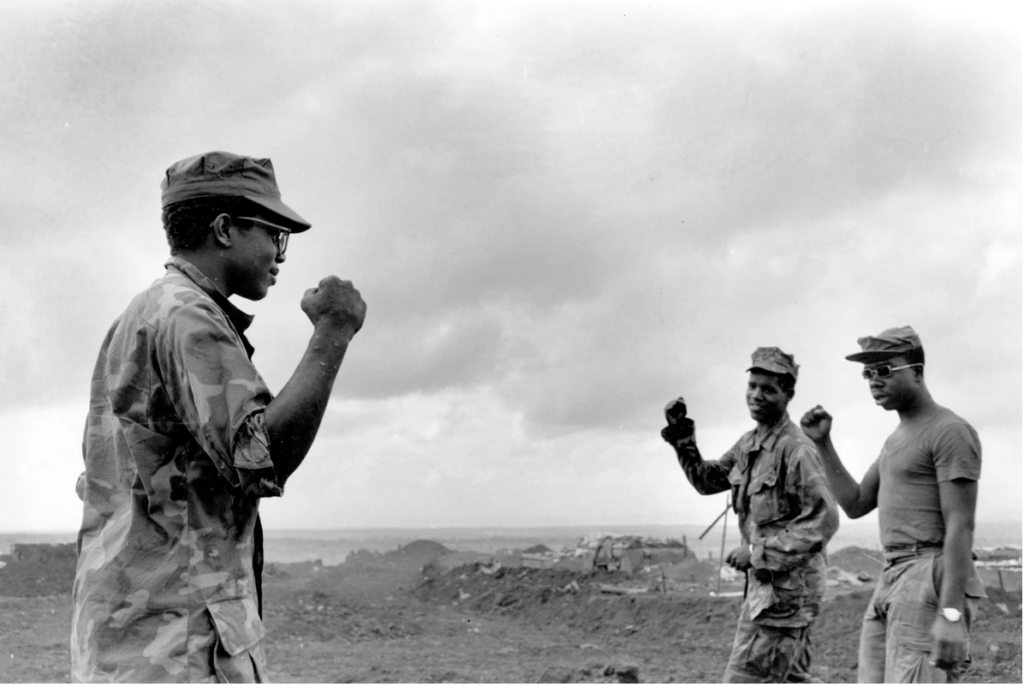Juris had apparently been planning to write about Viet Nam for decades before he actually wrote “Red Flags” and “Play the Red Queen.” These are character sketches he wrote in the 1960s or early 1970s for what seems to have been some sort of heist novel with veteran protagonists. Of the five main characters, three are Black, and reflect Juri’s observations of race relations in and out of the army:
“*Frank, about 27-28, is the oldest of the vets. He had enlisted for an extra year and did a second tour in Vietnam to avoid the regimentation of stateside duty and make rank faster. Was quite seriously considering a career in the army. Quite straight. Dry but steady. He had been the platoon sergeant, well respected, especially trusted for his fast, good judgments in combat situations. Had the fewest casualties of any platoon. Would balk against officers when he thought they were endangering his people. Decided against a military life after returning to the U.S.
“Working at an employment agency or Detroit auto plant in a mindless job well below his talents. Unused to not having the respect and obedience that were his in the army. Not an equivalent ‘rank,’ his job on the outside, but he can’t see the army or the war as a permanent answer.
“A good dresser, maintaining the proper image prescribed by the Man for the acceptable Negro. Mature enough not to show how he hates being patronized but does indeed hate it, although he knows the fight is all uphill and will go on beyond his lifetime.
“Distant from the others by virtue of his age, character, rank in the service. Yet he’s the one they obey instantly.
“*Bernard, in his early twenties. Always unhappy with the Man. Always in trouble because of it. Expelled from high school. Got back in because the coach interceded. Busted a lot in the army. Constantly given the most dangerous and dirtiest jobs as a result of resisting the white officers, fighting the system. Went AWOL from a hospital near Saigon, where he was recuperating from a shrapnel wound, and wound up in “Soul Alley,” the Black GI Casbah.
“To get out of the Alley, he drugged himself and surrendered to the military as an addict because of some amnesty granted to hooked GIs. Not prosecuted for going AWOL. Put into Frank’s platoon on the theory that a Black sergeant might be able to handle him.
“Reed handles him by bluntly telling him the situation—that the white, soft, educated, humane officers would indeed get him killed. That it was for real, and the only way out would be to keep quiet until he rotated, or got killed.
“After the service he got really involved in political, militant Black groups.
“*Sylvester “Silver” Reed, in his early twenties. From NYC, has known Bernard since high school. The company requisition, known for his ingenuity in bartering and permanent borrowing of equipment, rations, clothing, munitions, vehicles, etc., as needed by his outfit. His black market side ventures –“Black capitalism,” as Silver calls it—are known but tolerated by the commanding officer because Silver is as likeable as he is larcenous. He never knocked over anyone in his own outfit, charged the lowest interest loans to other GIs. He did sell souvenir weapons, flags, etc., to young officers in the outfit but this really amounted to just another example of Silver’s agility and psychological know-how in dealing with people allegedly smarter and better educated. Sort of a standing joke that the young lieutenants would fall for high-priced junk. Sort of selling snow to the Eskimos.
“Went to school with Bernard, where both played basketball. Similar only in that neither one will obey the System, any system. However, Silver has specialized in circumventing obstacles created by his color to get his way while Bernard resists openly and frontally and has always been in trouble with the Man. Silver takes the Man and the Man even likes him.
“Wants a bankroll to open a gambling house in NY or a club in Denver, where he has been stationed for the last nine months.
“Always scheming, though many of his ‘schemes’ are not taken seriously, just enjoyed by his buddies. Many of them were just part of the wheeler-dealer role, but now Silver has come up with a quick, big money idea that is for real.”
Unfortunately, Juris’s notes don’t say what the quick, big money idea is – or how Bernard, Silver, and Frank will come together to pull it off ….
